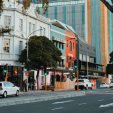Yes, there’s wine, but also art, yoga, cooking classes & kudu macarons
Cape Town inner city is set for a extensive facelift
The city centre of Cape Town, including the a area around City Hall, will undergo an extensive face lift.
The city centre of Cape Town will undergo a major facelift, to make this particular area " work for both locals and tourists".
Cape Town's station deck for instance, an inner-city crime hotspot, is one of the public spaces that will benefit from a planned upgrade.
Cape Town Partnership (CTP) chief executive, Andrew Boraine, said that security and cleanliness are key issues. He said that Spire, the new property manager of Golden Acre, wants to rent the bridge that links the Golden Acres shopping mall and the station deck, from the council. They would then place additional security officers on this vital pedestrian link.
The bridge, used by many of the 54 000 people who walk through Golden Acre on a daily basis, is gradually being dismantled. The underground concourse is also reportedly a popular escape route for muggers.
The park, one of the few green belts in the city, could be better utilised. Boraine said any station improvements would have to correspond with an upgrade of Strand Street.
The bottom of Strand Street, which has no pavements, hinders access by pedestrians between St George's Mall and the station. He would like to see the pavements replaced along Strand Street and better pedestrian access.
The CTP and the city are discussing the future of the Grand Parade, Cape Town's oldest public space. One possible option is to remove cars from the area to make it pedestrian-friendly. This could, however, mean the loss of 400 parking bays.
"We also need to look at whether the current high mast lighting is appropriate for a public space and whether we need more trees."
CTP has employed homeless people living on the Parade as cleaners. Boraine said the deployment of four security guards, housed in a prefabricated kiosk on the Parade, had been successful in deterring crime.
The Grand Parade, with its existing food court, needs a facelift to make it more appealing to locals and tourists. "If this city works for the locals, it will work for the tourists," said Boraine.
Important residential developments adjoin the Grand Parade, including the Art Deco landmark Mutual Heights, and the Wellington Fruit Growers building. "More than 40 buildings are being upgraded in the city and, by the end of 2006, there will be 3 500 apartments in the inner city," said Boraine.
He said the low density of people now living in the city hindered economic growth. "There are only 50 000 people living in the city bowl. If one considers that there were 60 000 people in the former District Six, we have gone backwards.
Thirty potential sites have been identified for affordable housing. Boraine added that, by having more people living in the city close to work, traffic congestion would be reduced.
(Source: Cape Times / October 5 2005)









